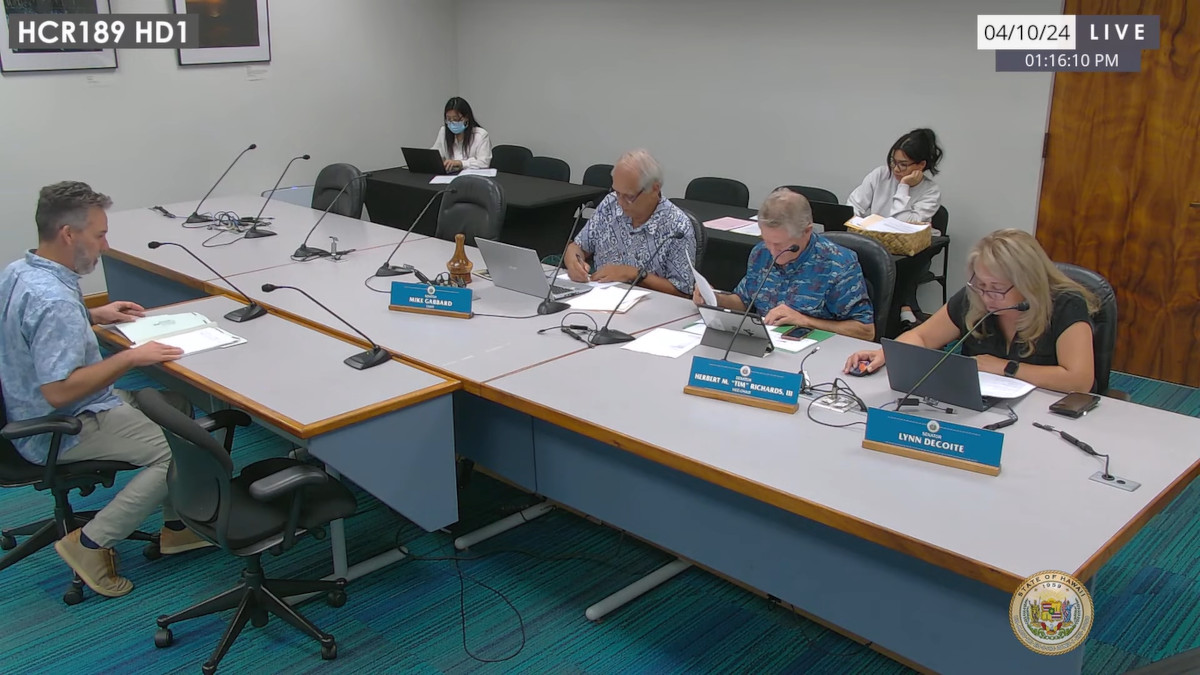(BIVN) – State legislation concerning biocontrols for certain grasses in Hawaiʻi was discussed at a Hawaiʻi State Senate committee hearing on Wednesday.
State departments expressed opposing viewpoints on HCR189 HD1, a measure urging the state “to prohibit the introduction of biocontrol agents that might threaten economically important forage grass species.” The Hawaiʻi Department of Land and Natural Resources is opposed to the measure, while the Department of Agriculture is in favor. The resolution was heard by the Senate Committee on Agriculture and Environment.
AEN public hearings on April 10, 2024, via State Senate on YouTube
The discussion comes as the state considers all the different tools that can be deployed to reduce the invasive grasses that increase fuel loads and the risk of wildfire in Hawaiʻi.
“As wildfires become more common and devastating, we turn our attention to ways to prevent these catastrophes,” wrote the Hawaiʻi Cattlemen’s Council in support of the resolution. “Some organizations and agencies have suggested the introduction of biocontrol to reduce the presence of invasive grasses, but these biocontrol agents have the potential to cause damage to important forage grass species. These forage grasses are important tools for ranchers to use to feed their herds, which in turn produces ecosystem services that benefit the wider community. Ensuring that ranchers can continue to successfully raise their cattle means that there is stewardship of the land and benefits such as carbon sequestration, soil health, invasive species removal, groundwater recharge, fire fuel load reduction – all on top of the production of beef.”
“Targeting rangelands for biological control will create a cascade of issues,” wrote the Department of Agriculture in support of the measure. “Native grasses are unsuitable for grazing, so replacing forage with native grasses increases the acreage we would need to manage through mechanisms other than cattle, thereby increasing fire risks.”
In opposition to the measure, the Hawaiʻi DLNR says “extensive scientific and public review are already required for the release of biological control agents into the State.”
“A blanket ban on types of biocontrol would not be based on the scientific and socio-economic information on individual target invasive species that is required by regulators to release an organism for biocontrol,” wrote the DLNR. “The Department notes the use of biological control does not lead to eradication of species. Indeed, it is plausible that researchers could find natural enemies of invasive grasses that would reduce the risk of catastrophic wildfire, while increasing the value of the grass as forage to ranchers. A blanket ban that is not based on scientific studies would preempt such win-win scenarios from being realized.”
The DLNR also noted that the resolution fails to explain which grasses would be included under the ban, nor who would determine which grass species are “economically important.”
“If this were a bill that mandated something, I do agree with DLNR; we don’t want people in this building making policy decisions for something that should be done scientifically,” said the State Senator from Hawaiʻi island, and committee vice chair, Tim Richards. “That being said, this is a statement of direction. And so I will be supporting it because the idea is – lets be mindful of economics while we are making these decisions.”
The Senate committee voted to recommend the measure be passes, unamended.


by Big Island Video News7:14 pm
on at
STORY SUMMARY
HONOLULU - Some state agencies warn targeting rangelands for biological control "will create a cascade of issues", while others oppose an outright prohibition.